#quasiplatonic attraction
Text
I totally do NOT have a huge squish on my friend 👀
#seriously tho plz help#he’s so cool#qpr#qpp#queerplatonic#queerplatonic attraction#quasiplatonic#quasiplatonic attraction#platonic attraction#quasiplatonic relationship#queerplatonic relationship#queerplatonic relationships#lgbt#mogai#liom
89 notes
·
View notes
Text
I love that calling him my friend, partner, best friend and boyfriend are all terms that can and do coexist with the same level of importance and meaning
#queerplatonic relationship#qpr#qpp#quasiplatonic#alterous attraction#queerplatonic#alterous#lgbtqia+#queerplatonic partner#love#transgender#aroace#boyfriend#partner#friendship#aromantic#asexual#alterous relationship
187 notes
·
View notes
Text
Sapphoplatonic Pride Flag
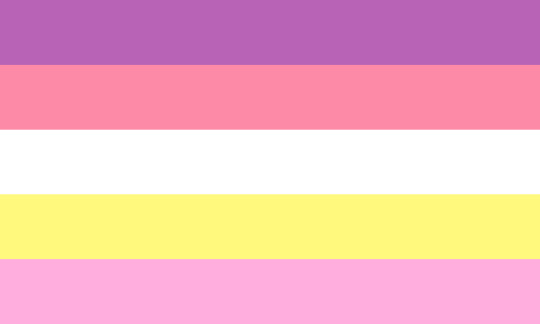
Sapphoplatonic or saphatonic (saplatonic/sapphatonic, sapphiplatonic/saphiplatonic, saphlatonic, sapphlatonic, or saphplatonic/saphoplatonic): being sapphic platonically and/or queerplatonically/quasiplatonically (sapphoqueerplatonic, sapphoquasiplatonic/sapphiqueerplatonic/sapphiquasiplatonic, sapphasiplatonic, or quasisapphic); identifying as a wlw/qlw/wlq in a platonic way; experiencing platonic attraction to women as a woman and/or queer folk.
#sapphic#wlw#platonic attraction#love#platonically#queerplatonic#qplatonic#qlw#wlq#nblw#nlw#quasiplatonic#mogai pride flags#mod ap#pride month#flag
37 notes
·
View notes
Text
what would you say if i wanted you the way the sun wants the moon . in an orbit , paired , never touching. always together , never together , eclipsing just for a moment. what if i said i sometimes wonder what it would be like to hold you . to be held by you . to be the one who shared an identical set of keys with . the one you turn to when things get hard . the one you ask for forever from . my lovely best friend , please don’t cry . i think we always knew this would be the way we ended up . full minds , an endless list of what ifs .
#alterous#alterous attraction#tertiary attraction#aromantic#aro#qpr#queer platonic partner#queer platonic relationship#quasiplatonic#admin posts
224 notes
·
View notes
Text
Hello and welcome!
This is a culture is blog for queer/quasiplatonic relationships. Feel free to send asks starting with something like "qpr culture is" (things relating to qprs such as polycules, squishes, and qpps are perfectly fine too). If you'd like your ask to be a little more specific (ex. autistic qpr culture is, aroace qpr culture is, long distance qpr culture is) that is more than perfectly fine as well.
Please be aware that I usually try to post asks starting with the oldest ones first, so if I currently have a lot in my inbox it may take a while to post yours, but I promise that I'll try to get to it.
If you have any questions about qprs (or related topics) you can either dm me, send them in the asks, or send a message in the qpr discord server (linked below), and I'll try to answer your questions to the best of my ability. I prioritize questions and will try to answer them as soon as I can (they're exempt to the earlier stated rule of posting oldest asks first). If you want multiple perspectives on a matter, I suggest asking in the discord server. I will also note that I occasionally do ask for others advice on questions I dont have an answer to or have mixed opinions on in the discord server, but when I do I usually say so in the post. if you are uncomfortable with that, and would prefer I answer the question without the help of others, please tell me that in the ask.
more information about the blog and myself below the cut (as well as the discord server link)
link to the qpr discord server:
this link is permanent and shouldn't expire, if you have difficulties with it just let me know through messages or an ask. the server is a place to share thoughts, experiences, rants, ask questions, and make friends. you don't need to be in a qpr, or even want to be in one for that matter, to join as long as you're respectful and want to learn more about qprs or make friends within our community.
I'd prefer anyone that joins the server be 13 years or older because discord is a teen rated app (and there are many adults on the server). there is little to no explicit content mentioned on there, so I won't limit sources to those younger than 13 and say you're not allowed at all, just know I don't prefer it.
this server is also surely not limited to just qpr related conversations. like I said anyone interested in the community can join and have respectable convos about different things on there.
a little bit about me (the admin of this blog)
I'm Sam, I usually prefer they/them pronouns but they/he/she are also fine as long as you use them interchangeably (I don't mind it/its or xe/xem either but the others are preferred). I'm fine with just about any compliments (fem, masc, and gn). mx is preferable as well but ma'am is also fine
as for my labels, im greyromantic ace and trans (somewhere under the genderqueer and nonbinary umbrellas)
ive only been in one qpr before (and it didn't exactly last long), but despite the fact I have a good bit of knowledge on qprs and am constantly trying to learn more to help others
Frequently asked questions
Can you be allo and still be in a qpr?
Of course! If the label feels comfortable use it
Can you have a queerplatonic partner and a romantic partner?
If the people you want to be your partners are comfortable with it, absolutely.
What exactly is a qpr, in simple terms?
They can be any relationship that doesn't feel quite like they fit the romantic or platonic labels. usually they do have the commitment of that of a romantic relationship but don't fully fit that label. they can be different for every queerplatonic couple
anyone is welcome to this blog as long as they're respectful
other information
im a bit forgetful and not always the most consistent with posting, but I surely will try my best with it
please use tone tags when necessary
please use caution/trigger warnings in asks when they apply
dni if:
you're in any way queerphobic
you're a terf
you're racist or ableist
you're hateful towards minority groups
you're hateful towards people because of (non toxic) religious beliefs
you intend to spread hateful or negative comments
if you violate the dni list above or make any rude or negative comments you will be blocked- there are no exceptions. this is a place for positivity. if you don't have anything nice to say don't bother typing.
#lgtbqia+#lgtbtq#lgtbq pride#queer platonic relationship#queer platonic love#queerplatonic#queer platonic partner#queer platonic attraction#quasiplatonic
88 notes
·
View notes
Text
ORIAQUEERPLATONIC
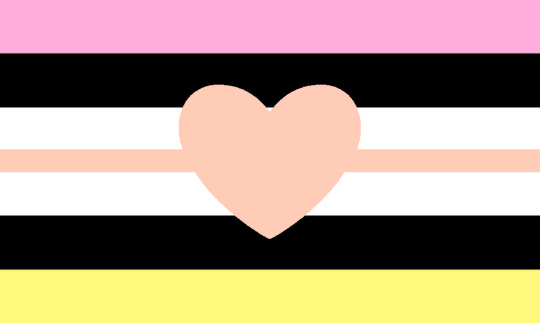
A label for people who experience queerplatonic attraction due to their BPD or who’s queerplatonic attraction can only be understood via BPD.
All people with BPD who want to use this label can use it, no matter diagnostic status! :D
DO NOT USE IF YOU ARE NOT BORDERLINE/DO NOT HAVE BPD.
#actually borderline#bpd stuff#living with bpd#queerplatonic#quirkyplatonic#quasiplatonic#lgbtqia#aspec#arospec#acespec#alterous attraction#borderline personality disorder#actually eupd#eupd#emotionally unstable#emotionally unstable personality disorder
22 notes
·
View notes
Text
General Aspec Terms
These are going to be some general terms used in the Aspec community and their meanings!
・Aspec - Short for "Aromantic/Asexual Spectrum" (use this when referring to both the aromantic and asexual communities as a whole!)
・Arospec - Short for "Aromantic Spectrum" (Use this when referring to the aromantic community as a whole)
・Acespec - Short for "Asexual Spectrum" (Use this when referring to the asexual community as a whole)
・Alloromantic/Allosexual - The opposite of asexual/aromantic! When someone does feel romantic/sexual attraction they are considered to be alloromantic/allosexual.
・Amatonormativity - Amatonormativity is the assumption that monogamous romantic/sexual relationships are central to life and that relationships that meet the amatonormative standard are inherently better than relationships that fall outside that standard.
・Non-partnering - Non-partnering aros/aces are aspecs that do not wish to have significant others.
・ S.A.M - Short for "Split Attraction Model" The Split Attraction Model helps us understand human sexuality and attraction in a more detailed way. It recognizes that attraction isn't just one simple feeling, but can be made up of different parts. Such as, romantic attraction, sexual attraction, and alterous attraction.
・QPR - Short for "Queerplatonic/Quasiplatonic Relationship" A QPR is a relationship that goes beyond what is normal for the stereotypical platonic relationship but usually isn't romantic either.
・AroAce - AroAce is a term to describe someone is who both aromantic (aro) and asexual (ace). Not everyone on the aspec is aroace!
・Romance/Sex Repulsed, Indifferent, and Favorable - In the aspec community you will find that many of us have varying feelings on engaging in romantic/sexual things regardless of our identities, so we use these descriptors to tell others what we are and are not comfy with!
A brief guide to repulsed/indifferent/favorable
・Favorable - If someone is romance/sex favorable that means that they are comfy with and may enjoy romance/sex even if they are aro/ace.
・Indifferent - If someone is romance/sex indifferent that means that they are neutral about romance/sex. They don't hate it but they don't go crazy for it either.
・Repulsed - If someone is romance/sex repulsed that means that they are uncomfortable with romance/sex.
569 notes
·
View notes
Text
Your Valentine's reminder
if ur someone in quasiplatonic relantionships you're as valid as any other person with friends/partner!! don't let people shun you if your way of showing platonic love is thru intimacy others feel should be only for couples!!
Aromantic people who exprience sexual attraction exist and are cool
And so are people who feel the way our society labels and puts paramenters on what type of consesual intamacy is ok between friends or partners is stupid
Sexuality is a very important thing for a ton of people whether it'd be aro people, non aro people and specially some SA survivors and their way of showing affection should not be suject to ridicule or the assumption that people like this are pushing an unhealthy societal dogma of sex being the only goal in relantionships.
Everyone is different, mind ya business and love whoever you love the way you feel is true to you <3
#text post#txt#valentines day#quasiplatonic#queerplatonic#aromantic#arospec#aroallo#sex positive#queer positivity
12 notes
·
View notes
Note
I’m asexual and aromantic. I figured it out when I was 18, but didn’t fully accept it (and still don’t know if I truly do) now at 25. I go back and forth because on the one hand I don’t feel attracted to anyone in any capacity. On the other hand I do feel the urge to be in a relationship and have that closeness with someone. It’s an annoying situation to deal with.
A lot of people who are both asexual and aromantic still want/have relationships. You also don't have to experience attraction to have a relationship. All the things that really matter in relationships like how much you support each other and enjoy being with each other, etc. can be done regardless of attraction.
Asexual aromantics vary a lot how they feel about actual romance and sex, some enjoy one or both, some may not mind one or both, some would rather than not do either. Some are more complicated. But you can still have a relationship no matter where you fall on this spectrum.
One thing you may want to look into are QPRs, which stands for queerromantic relationships (also sometimes called quasiplatonic relationships or quirkyplatonic relationships). And that can be used for any type of relationship that can't be easily or simply categorized into a romance or friendship. A lot of QPRs are very heavily tailored to the people in them, and include what they want in a relationship but not what they don't. So for example committed platonic relationships, that are basically committed relationships, but without romance, are a common QPR arrangement.
But yeah, basically If a relationship or a life partner of some kind is important to you, it's something you can have.
If you're still having trouble accepting yourself as asexual and aromantic, I'd also recommend seeking out asexual and aromantic blogs and communities. Find people on social media who ace/aro who seem interesting and you want to follow. Consider joining communities, like a Discord server or checking out an ace/aro meetup if there's any near you. Even just lurking can be helpful, but participating is good too if you're comfortable doing that.
Seeking out ace/aro media is good too. There's a lot more out there than their used to be, especially books and podcasts (and there's a lot of rec lists out there too if you don't know where to start).
Generally this kind of thing is the most helpful when you're trying to accept your identity. Something about seeing real complex interesting people who are like you can really make a difference.
All the best, Anon! Good luck!
23 notes
·
View notes
Text
a post on queerplatonic
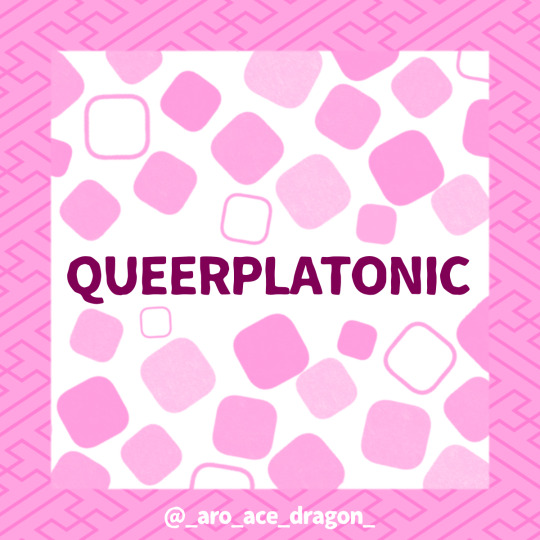
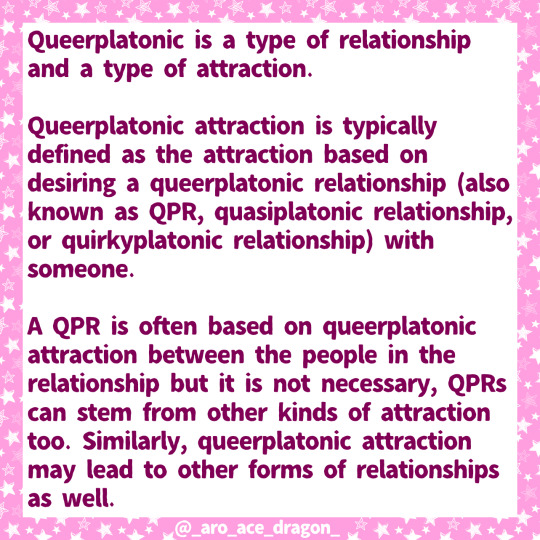



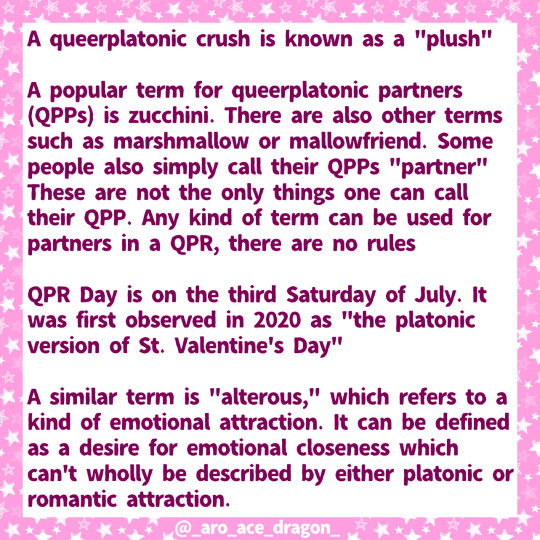

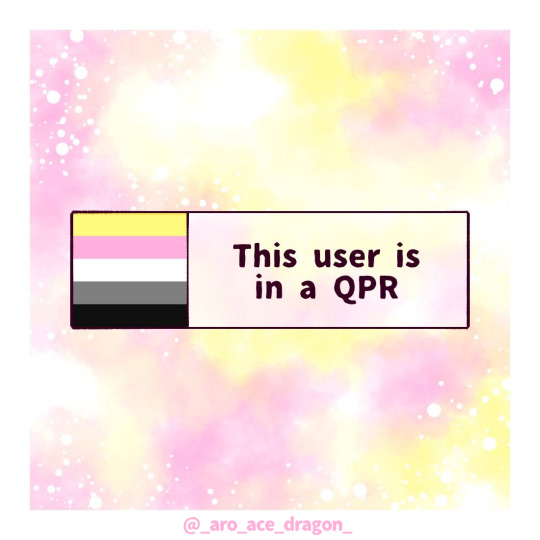
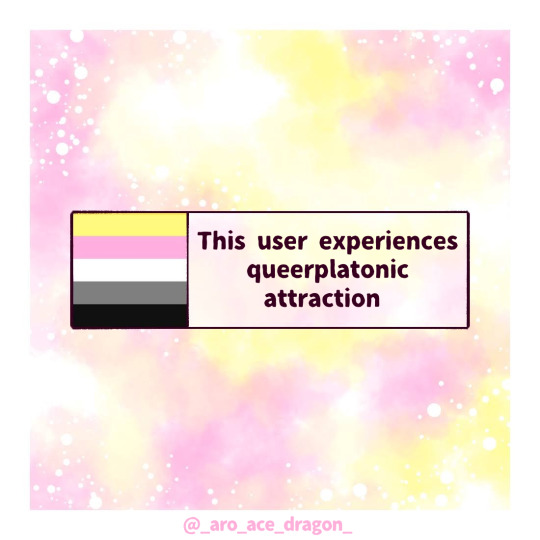

Image description:
several square images with a light pink border with text within.
Image 1:
QUEERPLATONIC
Image 2:
Queerplatonic is a type of relationship and a type of attraction.
Queerplatonic attraction is typically defined as the attraction based on desiring a queerplatonic relationship (also known as QPR, quasiplatonic relationship, or quirkyplatonic relationship) with someone.
A QPR is often based on queerplatonic attraction between the people in the relationship but it is not necessary, QPRs can stem from other kinds of attraction too. Similarly, queerplatonic attraction may lead to other forms of relationships as well.
Image 3:
A QPR is a kind of relationship that is beyond the strict boundaries of platonic and romantic, which may have elements of either, both or neither.
What constitutes and defines a QPR depends on the people involved in it. Some QPRs resemble platonic or romantic relationships and some people even define QPRs as a type of platonic (or romantic) relationship, though this is not necessarily true for all QPRs. A QPR may or may not be sexual. It can be both monoam and polyam.
QPRs often aim to blur the rigid line between platonic/romantic relationships
Image 4:
A QPR looking like a platonic or a romantic relationship from outside does not make it "just a friendship/romantic relationship"
While this kind of relationship is typically seen and talked about within the aspec community, one does not need to be aspec to be in a QPR.
A QPR is not more than friendship" and/or "less than a romantic relationship" since objectively none of the three are "more" or "less" than the others in terms of intensity, commitment or intimacy.
Image 5:
There are two main queerplatonic flags:
Yellow: platonic attraction (yellow heart represents platonic love)
Pink: a lighter version of red, which often represents romantic attraction
White, grey and black: likely represent the grey-aro spectrum
This image also contains two flags. One has five stripes, pink, yellow, white, grey and black from top to bottom. The other has a yellow heart on 7 stripes: pink, black, grey, white, grey, black and pink.
Image 6:
A queerplatonic crush is known as a "plush"
A popular term for queerplatonic partners (QPPs) is zucchini. There are also other terms such as marshmallow or mallowfriend. Some people also simply call their QPPs "partner"
These are not the only things one can call their QPP. Any kind of term can be used for partners in a QPR, there are no rules
QPR Day is on the third Saturday of July. It was first observed in 2020 as "the platonic version of St. Valentine's Day"
A similar term is "alterous," which refers to a kind of emotional attraction. It can be defined as a desire for emotional closeness which can't wholly be described by either platonic or romantic attraction.
Image 7:
A userbox with the queerplatonic flag and text that reads: this user wants a QPR
Image 8:
A userbox with the queerplatonic flag and text that reads: this user is in a QPR
Image 9:
A userbox with the queerplatonic flag and text that reads: this user experiences queerplatonic attraction
Image 10:
A userbox with the queerplatonic flag and text that reads: this user uses the label queerplatonic
#queerplatonic#qpr#queerplatonic relationship#queerplatonic attraction#queerplatonic partner#info#my post
39 notes
·
View notes
Text
I have taken upon myself to do an entire sexuality list. now this may be a little off because I'm stupid but it took me for ever and I'm proud of it I'm just here to spread positivity
Abnosexual (Abnosexuality is the fluxuation of attraction, either sexual, romantic, or platonic.)
Abrosexual (your sexuality is often changing)
Aceflux (you are asexual but you often change you romantic attraction according to gender)
Aequesexual (you have a very strong attraction to sexuality and value sexual experiences)
Aerosexual (Aerosexual is having next to no preference in gender. It can also be fluid)
Agynosexual ( Agynosexual is anyone who has no sexual feelings towards femininity, but may have other attractions)
Akoisexual (someone who experiences sexual attraction to people but has no desire to have those feelings reciprocated)
Aliquasexual ( only feels sexual attractions under very specific circumstances)
Allosexual (feels sexual attraction to any person and all people)
Amorplatonic ( experiencing romantic attraction but only wanting to be in queerplatonic/quasiplatonic relationships)
Androbisexual (Sexually attracted to two or more genders, but predominantly to men/masculinity. Can be used by a person of any gender)
Androflexibility (a person who is mostly attracted to men but very occasionally feels attraction toward women or other genders)
Androsexual (people who are attracted to masculinity)
Androgynosexual (sexual attraction to both men and women with an androgynous appearance)
Anegosexual (belong in the aace umbrella term)
Anthrosexual (turning a blind eye to gender)
amoretrosexual (is someone who is only attracted to people they know are attracted to them. An amoretrosexual person usually has no gender preference)
Apothisexual (microlabel on the Asexual Spectrum)
Asexual (you feel little to no sexual attraction )
Autosexual (you feel sexual attraction to yourself)
Avansexual (sexual attraction to exclusively non-binary individuals.)
Bisexual ( attracted to two or more gender usually men and women)
Boreasexual (having an exception to your usual sexual orientation)
Burstsexual (a-spec identity where one is normally completely asexual or aromantic but occasionally experiences sudden sexual attraction)
Casssexual (sexuality where one feels that sexual orientation is meaningless or where one is indifferent to the idea of sexual orientation)
Ceasesexual (An a-spec orientation where sexual attraction will sometimes disappear for a while)
Ceterosexual (attracted to people who are nonbinary or transgender)
Coeosexual (a sexual orientation where you only feel sexual attraction to someone if you developed that feeling upon meeting them the first time)
Cupidosexual (people who don't experience sexual attraction but still desire to be in a sexual relationship or engage in sexual behavior)
Demisexual (only feel sexual attraction to someone after they've formed a strong emotional bond with them)
Femmesexual (an individual who is exclusively attracted to individuals with feminine things)
Fictosexual (a Asexual identity for someone who mostly is attracted to Fictional characters)
Finsexual (for someone who is exclusively attracted to those who are feminine in nature)
Flexisexual (Having a fluid sexual orientation or pattern of sexual expression)
Fraysexual (someone who experiences sexual attraction towards people they don't know or don't know very well)
Gay (non-woman loving non-woman)
Graysexual (intentionally vague to accommodate the people who fall somewhere between asexual and sexual.)
Heterosexual (you are attracted to the opposite gender)
Homosexual (basically the umbrella term for lgbtqia+ members)
Iculasexual (is a term for someone who is asexual and sex-indifferent.)
Kalossexual (desire to have a sexual relationship yet never feeling sexual attraction)
Lamvanosexual (Wanting to have sexual ACTIONS done on you, but NOT on others)
Lesbian (non-men loving non-men)
Lithosexual (someone who experiences sexual attraction to people but has no desire to have those feelings reciprocated)
Masexual (sexual orientation where the individual feels sexual attraction and/or romantic attraction towards males)
Mascusexual (the attraction to men, masculine nonbinary people, and 100% androgynous nonbinary people)
Minsexual (the exclusive attraction to those who are masculine in nature (MIN). This means minsexual people are attracted to men)
Monosexual (romantic or sexual attraction to members of one sex or gender only)
Mutosexual (fluid sexuality in which your attraction changes from day to day)
Narysexual (sexual attraction or sexual behavior primarily/exclusively towards non-binary people.)
Neusexual (sexual orientation describing an individual who is exclusively attracted to individuals with neutral genders)
Ninsexual (exclusive attraction to those who are neutral/non-binary in nature)
Novisexual (feeling complicated attraction or lack thereof in such a way that it is difficult or impossible to fit into one word or term.)
Novosexual (sexual orientation changes as they experience a change in their gender identity)
Nullumsexual (nullumsexual is a label for non-allosexual people who do not want to use the label asexual or ace. It is a no label sexual orientation.)
Omnisexual (attracted to all gender but with exceptions)
Onesexual (sexual with or fall in love with only one person their entire life)
Pansexual (you don't care about gender it's just the soul and personality of the person)
Penultisexual (sexual orientation where the individual can be sexually attracted to anyone with a gender different than theirs
Polysexual (attraction to more then one person at the same time)
Pomosexual (not fitting any sexual orientation label in terms of conventional)
Proculsexual (identity that describes someone who only feels sexual attraction to individuals who they're sure they can never be in a relationship)
Queer (an umbrella term for people who are not heterosexual or are not cisgender)
Sanssexual (whose attraction changes randomly. Their orientation is very fluid and there is no trend line in the attraction)
Sapiosexual (finding intelligence sexually attractive or arousing.)
Semibisexual (sexual orientation that defines a person who feels sexual attraction towards one gender (usually the opposite but considers themselves to be bisexual or partially bisexual)
Skoliosexual (attracted to people who are nonbinary or transgender)
Spectrasexual (people who are sexually or romantically attracted to multiple or varied sexes, genders, and gender identities, but not necessarily all or any)
Taosexual ( only feel sexual attraction to another person if they feel a strong metaphysical connection with them first.)
Vultussexual (someone whom is attracted to someone just because of their appearance. It is somewhat the opposite of pansexual.)
Zygosexual (having or wanting more sexual partners with your current romantic and/or sexual partner)
now onto the pronouns!
Understanding gender
Understandings of gender continually evolve. In the course of a person’s life, the interests, activities, clothing and professions that are considered the domain of one gender or another evolve in ways both small and large.
people tend to use the terms “sex” and “gender” interchangeably. But, while connected, the two terms are not equivalent. Generally, we assign a newborn’s sex as either male or female (some US states and other countries offer a third option) based on the baby’s genitals. Once a sex is assigned, we presume the child’s gender. For some people, this is cause for little, if any, concern or further thought because their gender aligns with gender-related ideas and assumptions associated with their sex. Nevertheless, while gender may begin with the assignment of our sex, it doesn’t end there. A person’s gender is the complex interrelationship between three dimensions: body, identity, and social gender.
Gender identity is our internal experience and naming of our gender. It can correspond to or differ from the sex we were assigned at birth.
Understanding of our gender comes to most of us fairly early in life. According to the American Academy of Pediatrics, “By age four, most children have a stable sense of their gender identity.” This core aspect of one’s identity comes from within each of us. Gender identity is an inherent aspect of a person’s make-up. Individuals do not choose their gender, nor can they be made to change it. However, the words someone uses to communicate their gender identity may change over time; naming one’s gender can be a complex and evolving matter. Because we are provided with limited language for gender, it may take a person quite some time to discover, or create, the language that best communicates their internal experience. Likewise, as language evolves, a person’s name for their gender may also evolve. This does not mean their gender has changed, but rather that the words for it are shifting
While the dimensions of gender and the desire for congruence are common to us all, ultimately gender is personal. Each dimension of gender is informed by our unique intersection of identities, experiences, and personal characteristics. We are more than our body, gender identity and gender expression: we are also our race, ethnicity, class, faith, sense of geographic place, family history, and more. Our gender is personal because, while we share some of these aspects of self with others, the way that all of these identities, influences and characteristics come together is unique to each of us.
One final distinction to make is the difference between gender and Sexual orientation, which are often incorrectly conflated. In actuality, gender and sexual orientation are two distinct, but related, aspects of self. Gender is personal (how we see ourselves), while sexual orientation is interpersonal (who we are physically, emotionally and/or romantically attracted to).
Why is it so critical to distinguish between these two concepts? When we confuse gender with sexual orientation, we are likely to make assumptions about a young person that have nothing to do with who they are. For example, when someone’s gender expression is inconsistent with others’ expectations, assumptions are frequently made about that person’s sexual orientation. The boy who loves to play princess is assumed to be gay, and the girl who buys clothes in the “boys’” section and favors a short haircut may be assumed to be a lesbian. These could be faulty conclusions. What someone wears and how they act is about gender expression. You cannot tell what a person’s sexual orientation is by what they wear (for that matter, you can’t know what their gender identity is either, unless they tell you).
Our society’s conflation of gender and sexual orientation can also interfere with a young person’s ability to understand and articulate aspects of their own gender. For example, it’s not uncommon for a transgender or non-binary youth to wonder if they are gay or lesbian (or any sexual orientation other than heterosexual) before coming to a fuller realization of their gender identity. How we come to understand our gender and our sexual orientation – and the choices we make to disclose and express these parts of ourselves – are distinct paths. Thinking of these two aspects of self as interchangeable may, instead of helping us know ourselves and one another better, actually get in the way of understanding and communication.
although there are a lot of genders, there's always one for you and I'll bring up a short list of the most commonly used genders with their descriptions
Agender
Not having a gender or identifying with a gender. They may describe themselves as being gender-neutral or genderless.
Bigender
A person who fluctuates between traditionally “male” and “female” gender-based behaviours and identities.
Cisgender
A person whose gender identity and biological sex assigned at birth are the same. For example they were born biologically as a male, and express their gender as male. Often used in the shortened form 'cis'.
Gender Expression
The external display of one’s gender, through a combination of how they dress, how they act and other factors. This is generally within the context of what society expectations of gender are.
Gender Fluid
A person who is gender fluid may always feel like a mix of the two traditional genders but may feel more man some days, and more woman other days.
Genderqueer
A gender identity label often used by people who do not identify with being a man or a woman, or as an umbrella term for many gender non-conforming or non-binary identities.
Gender Variant
Someone who either by nature or by choice does not conform to gender-based 2expectations of society.
Mx.
Is a title (e.g. Mr., Ms., etc.) that is gender neutral. Pronounced miks, (similar to Ms) it is often the option of choice for folks who do not identify as cisgender.
Non-Binary
A gender identity and an umbrella term for people whose identity falls outside of the binary of male and female. Some people don't identify fully, or at all, with the gender they were assigned at birth and some people have no gender at all.
Passing
When someone who is gender variant is regarded to be, or 'passes' as a cisgender man or cisgender woman.
Third Gender
A term for a person who does not identify with either man or woman, but identifies with another gender. This gender category is used by societies that recognise three or more genders, both contemporary and historical, and is also a conceptual term meaning different things to different people who use it.
Transgender
A person who lives as a member of a gender other than that expected based on sex assigned at birth. Trans people may describe themselves using a range of different terms.
Transgender man
A term used to describe someone who is assigned female at birth but identifies and lives as a man. This may be shortened to trans man, or FTM, an abbreviation for female-to-male.
Transgender woman
A term used to describe someone who is assigned male at birth but identifies and lives as a woman. This may be shortened to trans woman, or MTF, an abbreviation for male-to-female.
Two-Spirit
Is an umbrella term traditionally used by Native American people to recognise individuals who possess qualities of both genders
Ze / Hir
Alternate pronouns that are gender-neutral. Pronounced "zee" and "here" they replace “he” and “she” and “his” and “hers” respectively. Alternatively, some people who are not comfortable/do not embrace he/she use the plural pronoun “they/their” as a gender neutral singular pronoun.
gender does not mean pronouns you can be agender and still have pronouns. there are many to choose from, but that doesn't mean that you have to worry about it
7 notes
·
View notes
Text
So I recently asked my best friend to be my qpp and he said yes!! On my birthday!
Apparently he's had a side blog for ranting about his feelings for me for quite a while now, and I thought that seemed like a good idea. So here we are.
For context we're both various flavours of aroace and had been close for a while but I wanted the commitment so. Yay!
Anyways if you're him and you found this no you didn't.
For everyone else, this will be my feelings dump, which I hope you can find entertaining or even a little inspiring - I'm more than happy to answer any asks about all things qpr and aromantic, or even any random questions.
Have a nice day!
#queerplatonic#qpr#alterous attraction#demisexual#demiromantic#demialterous#alterous#aromantic#asexual#lgbtq#lgbtqia+#queerplatonic relationship#quasiplatonic#transgender#<<thats him#aroace#acearo#aromantic asexual
39 notes
·
View notes
Photo

The Plottage Pride Flag. I coined this term, I got plottied, I designed the flag, and I created the Urban Dictionary definition in the order. To quote my own Urban Dictionary post:
"The platonic/queerplatonic equivalent of marriage. To engage in plottage is to "plotty," doing plottage is "plottying," and having entered a plottage is "plottied." Since some friends are incredibly close and the line between platonic (just close friends) and queerplatonic (blurring the lines between romantic and platonic social norms often to the extent of prioritizing a non-romantic relationship as much or more than a romantic one) is often blurry, either friends or queerplatonic partners can get plottied, and it's okay if the partners plottying call their relationship different things so long as they've both/all agreed to it.
"Plottage is not necessarily monogamous, although it absolutely can be, and plottage ceremonies can come in all shapes and sizes. They can be large affairs or intimate little "elopements," just like with weddings, and like with weddings, the focus of a plottage ceremony is for the bonding people to express their love and potentially lifelong commitment to each other, with the difference being that they're not romantic. Just like with marriage, plottages can end in divorce (called breakups) or death (resulting in widowhood).
The people participating in a plottage can be called "plotmates," although they can call themselves and each other whatever they please.
"Claire: My mother told me to wait until plottage before so much as high-fiving Jason!
"Monica: That's bunk! Me and my plotmate have been plottied nineteen years and we certainly didn't wait!
"Claire: I may have agreed to plotty Jason just so I can touch him! Do you think plottying him is a bad idea?
"Monica: Just be glad it's not legally binding!
"Claire: About that–
"Monica: Jeepers Cripes, Claire!"
Flag Meaning:
The colors are taken from the queerplatonic/quasiplatonic/quirkyplatonic/qplatonic attraction flag and have the same meaning here as they do in that flag.
The shape is modeled after the sologamy flag to represent alternative forms of love.
The inspiration for the lowercase theta in the middle comes from certain -amorous and -gamous flags having Greek letters in the middle. I picked the theta because a quick (and dubious) Google search yielded theta as the Greek equivalent of Q, and I wanted the Greek letter to represent queerplatonic/quasiplatonic/quirkyplatonic/qplatonic relationships.
:)
44 notes
·
View notes
Text
qpr culture is just yearning for a qpr with your squish instead of actually asking them to be in qpr with you bc you don't know how to
#qpr culture is#qpr#quasiplatonic#queer platonic attraction#queer platonic partner#queerplatonic#queer platonic love#queer platonic relationship#qpr yearning#qpr positivity
45 notes
·
View notes
Text
Some answers to some questions and accusations im sick of seeing
“A queerplatonic/quasiplatonic partnership is just being friends”
Do YOU have a friend that you prioritize above others, would be willing to move in with, marry for benefits, or coparent with, if you weren’t in a romantic relationship? Almost no one would say yes to that, but to an aromantic person who desires a partnership, they might want a name for that. And even then, some people define their QPR’s as being totally different from how they experience friendships.
“Your idea of romance is based in a capitalists idea of what a romantic relationship entails, and you don’t need an identity for not buying into it.”
Not all aromantic people define themselves as being aromantic because they hate dating culture. However, those that do aren’t invalid for doing so. We all live in this capitalist society, and if a person finds the idea of romance and dating as a capitalist presents it repulsive and identifies as aromantic because of it, that’s not a bad thing.
“Aromantics are just people who can’t get dates”
Aromantic people aren’t repulsive losers who can’t get a date, and if you think so you should examine why you think so poorly of people who aren’t in romantic relationships. There are societal punishments for people who decide to never get married, and living alone has never been harder. This is not a problem unique to the aromantic experience, so think hard about why you think this.
“How can someone be Aromantic and still want to go on dates?”
Plenty of aromantic people like spending time with others and like sex. A person deciding to have a date with someone for fun rather than romance is more normal than you would think. Likewise, a person can have a relationship that might look romantic to an outside, but what you see does not equal that actual persons reality.
“Aromantics just don’t want commitment”
A QPP is not a relationship without commitment, and an aromantic person might even have mutiple partners or be polyamorous. That said, if a person is uncomfortable in committed romantic relationships and feels anxiety at the idea of being in one, and identifies as aromantic as a result, that’s a personal choice. Some people simply don’t want or can’t handle those kinds of relationships.
“How can you be polyamorous and aromantic?”
Some aromantic people call themselves such because they are on the aromantic spectrum, and experience some or very little romantic attraction, and might have mutiple partners. Or it might be a person has no romantic attraction, but mutiple QPR’s, and call it polyamorous for lack of a better term.
“Aromantics are just sex obsessed”
This is a take I see too often from asexual people who should know better at this point than to alienate a person for lack of attraction. There’s nothing wrong with a person desiring sex and not desiring romantic relationships. If you have issues with hookup culture or have had bad experiences with hookups in the past, you can say that instead of implying that people who want sex without romance are morally bankrupt.
#aromantic#alloaro#aroace#long post#I’ve had this in drafts for a year. anyways be decent to aro people or else#also I’m litterally a dyke I’d like it if people stopped treating both parts of my identity as a huge joke thanks <3
17 notes
·
View notes
Text
Okay, generally specific thoughts on sexuality because I’ve been watching all the queer shows that have come out recently, and calling myself the “straight friend” is starting to feel like a lie.
I’m gonna start with the types of attraction and how I feel about each of them:
Sexual attraction: this is something that I’ve understood about myself for a long time. I rarely experience sexual attraction, especially in the moment. I never look at a person and have sexual desires or wants in relation to that person. However, I do still experience sexual impulses, just not necessarily strong ones. I am definitely not interested in this type of physical intimacy with women, but would like an eventual physically intimate relationship with a man. A lot of it is contingent on emotional connection, which I will get to later.
Romantic attraction: once again, I have never really been the type of person to get crushes and can count the number of actual crushes I have experienced in 24 and a half years of life on one hand. I don’t feel romantic attraction when it comes to women, but do feel some when it comes to men. Every once in a while I will wonder at the idea of a relationship between me and a man, and the idea does excite me, but for the most part I don’t really think about it, and I definitely know many people who are way more romantically inclined than I am.
Now we come to my three favorites:
Physical attraction: this one was interesting to consider, since physical touch is way at the bottom of my love languages, and I sometimes have sensory issues related to slight neurodivergency that mean I don’t always like being touched. However, this is definitely something I’ve experienced. I have certain friends that I want hugs from, that I want to sit next to and cuddle on the couch, and who I hold hands with. This goes for guys or girls or nb/trans folks, where my desire to be physically close to that person has nothing to do with sexual desire or romantic desire, but I want to have physical contact with them. I don’t feel this way about all of my friends, and this is sometimes contingent on their love language being physical touch and my love for them as a friend meaning I want to show them that I care about them and resulting in wonderfully platonic snuggles.
Emotional attraction: possibly my favorite and the one I most relate to, I feel emotional attraction to all types of people. I thrive off of deep interpersonal connection, and having a tight knit group of people that I am emotionally close to is my favorite thing in the entire world. The people in this group do not have to fall into any other category of attraction to be in this one, but I find these relationships incredibly fulfilling and wonderful, and they are some of the most important relationships in my life, if not THE most important. Also, usually my sexual and romantic attraction is more likely to happen with someone I am already deeply emotionally attracted to. Again, though, my emotional attraction to a person is completely separate from the previous types of attraction in almost every single way. This is a reason I relate to (but don’t know how much) the term “Queerplatonic” or “Quasiplatonic.” This also ties in a little to my physical attraction to some people who I’m extremely emotionally attracted to, where the combination creates this strange quasi relationship, where we aren’t romantically or sexually interested, but “just friends” is definitely not it.
Finally, aesthetic attraction: this one is easy for me. I am a visual artist, and I think that people are aesthetically pleasing, regardless of gender. For me this does not necessarily lead to sexual attraction, but I can honestly say that I find women, men, and trans/nb folks to be very aesthetically attractive. This is the extent to which I am able to relate to my wonderful bi, lesbian, pan, and etc friends when they talk about their attraction to whichever gender. I can understand the aesthetic attraction, but may lack the romantic and/or sexual attraction. But I do understand romantic and sexual attraction, so their attraction to people I am not attracted to makes sense.
Me vs. Labels
Now, reading this it may seem clear that there are some labels and umbrella categories that I could fall under (A-spec, asexual, demi/graysexual, aromantic, demi/grayromantic, queer/quasiplatonic), however, after research and personal life experience, I don’t really like the labels. For all that I have defined myself as a cis/het woman for the last 24 years, even that label doesn’t fully fit the way that I am. And as freeing as it has been for my friends and family members to discover a label that describes at least some part of their experience, I am not experiencing that. I don’t want to put myself into boxes with words on them that don’t accurately describe who I am or how I feel about things. Labels can be freeing, but they can also be limiting. Calling myself “the straight friend” feels like a lie, because I don’t experience a heteronormative existence. But I’ve been that friend for so long that even when I talk to my A-spec friends about it, it’s almost like I’m still on the outside of the equation. Because I’m not labeled, I don’t count.
This is something that I’ve only more recently begun to struggle with, despite knowing these things about myself for several years. I’d had conversations with one of my extremely queer siblings about it not long after they came out as a-spec, bi, and gender queer to me. For them, having labels and pronouns and all of those things was freeing, and changed their life for the better. But whenever I think about putting a label on myself, or even multiple labels to try to capture nuance, I get stressed. I don’t like it. I love language, I love words, I want to be a writer. But words are limited. They cannot fully capture what it is to be a person. I don’t want to be defined by words on a box, because who I am and how I exist is much deeper than that.
#somequeerishramblings#queer#lgbtqia#lgbtq#lgbt#a spec#asexual#graysexual#demisexual#aromantic#grayromantic#demiromantic#queerplatonic#quasiplatonic#labels#just some ramblings on my experience#currently feeling outside of the community despite probably fitting within it#no labels
3 notes
·
View notes